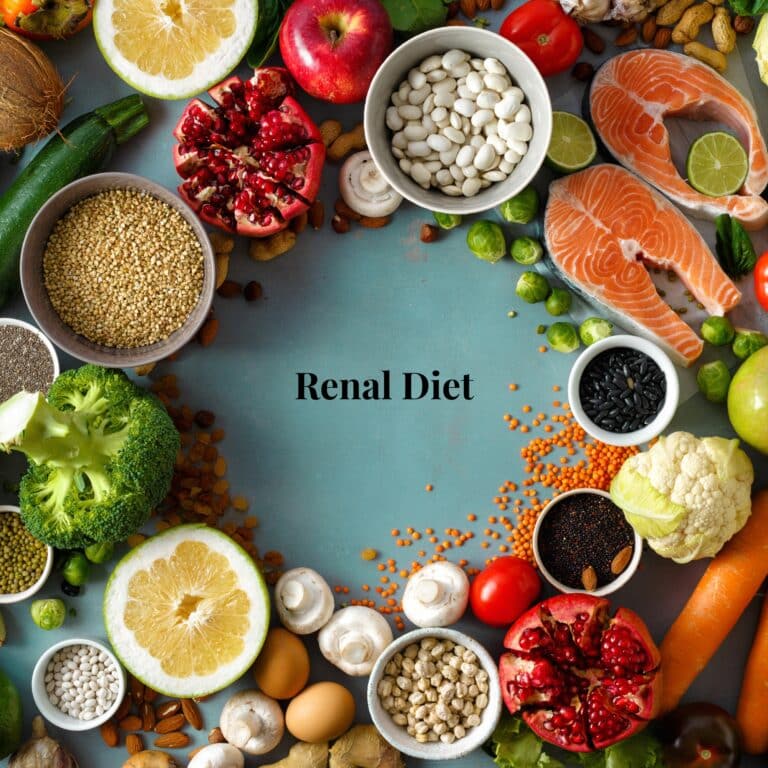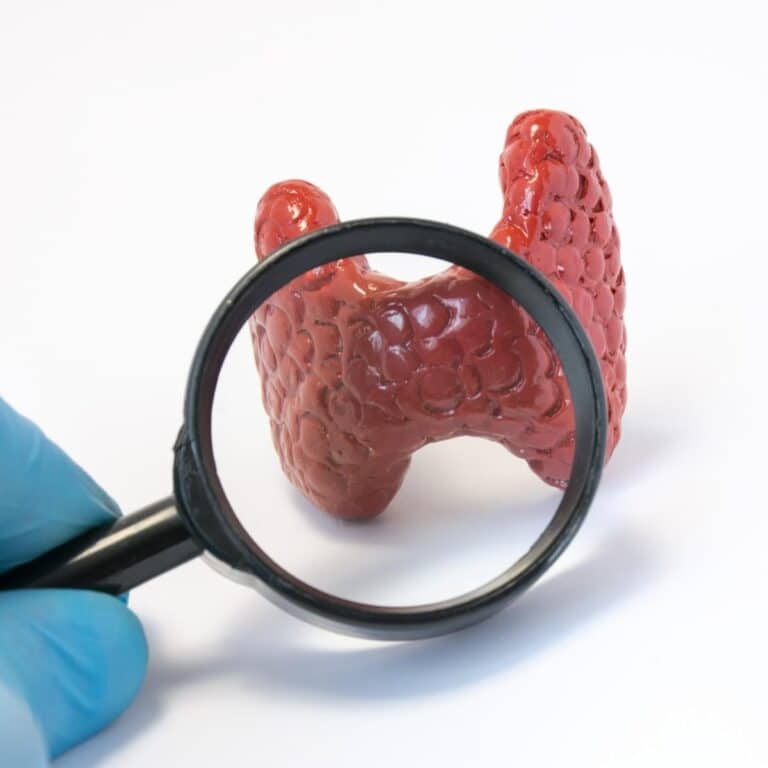Renal Dietitians: Kidney Nutrition Experts Know About CKD
Renal dietitians are unsung heroes in the battle against chronic kidney disease (CKD). These specialized nutrition experts play a vital role in the well-being of people with kidney disease by tailoring dietary plans to manage the condition.
Their expertise extends beyond basic nutrition and health concerns, as they navigate the intricacies of CKD, including sodium, potassium, phosphorus, and protein restrictions. Renal dietitians help patients strike a delicate balance between nourishment and kidney health, offering personalized guidance to alleviate strain on the kidneys and prevent complications like kidney failure.

In this article, we explore the critical role of renal dietitians as kidney nutrition experts and how their guidance empowers CKD patients to manage their condition effectively, creating health goals and providing nutrition care.
Jump to:
- Key Takeaways
- Understanding the Role of Renal Dietitians
- Importance of Diet in Managing CKD
- How Renal Dietitians Adjust Dietary Needs
- The Relationship Between Kidney Health and Nutrition
- Renal Dietitians and Chronic Kidney Disease Management
- The Impact of Lifestyle Changes on CKD
- Renal Dietitians and Meal Planning
- Nutrition Education for CKD Patients
- Medical Nutrition Therapy in CKD
- Finding a Renal Dietitian Specialist
- Frequently Asked Questions about Renal Dietitians
- Renal Dietitians Help Manage Your Renal Diet
Key Takeaways
- Renal dietitians play a crucial role in managing chronic kidney disease (CKD) by conducting nutrition assessments, creating personalized meal plans, and providing ongoing support and education.
- They specialize in developing nutrition plans tailored to CKD, taking into account factors such as kidney function, lifestyle, and overall health through nutritional counseling.
- Renal dietitians help patients understand necessary dietary changes and provide guidance and advice on food choices to optimize kidney health and establishing nutrition goals and menu plans.
- Nutrient adjustment strategies, such as reducing sodium, potassium, and phosphorus intake, are essential in managing CKD, and renal dietitians help develop and implement these strategies.
For More Recipes and Ideas --->> Get Your Free Meals and Recipes That Are Perfect for Pre-Dialysis Diets, Pre-Dialysis with Diabetes, or Dialysis Diets.
Understanding the Role of Renal Dietitians
Understanding the intricate role of renal dietitians is fundamental to comprehending the management of nutrition for Kidney Disease patients. These specialized nutrition experts go far beyond traditional dietary advice, crafting personalized nutrition plans that mitigate the unique challenges of CKD.
In this section, we dig into the crucial role played by renal dietitians, shedding light on their expertise in navigating the complex web of dietary restrictions, ultimately enhancing the health and well-being of CKD patients.
Dietitian's Responsibilities
Renal dietitians bear significant responsibilities in the care of Chronic Kidney Disease patients. They play a pivotal role in crafting individualized dietary plans tailored to the specific stage of CKD, managing the delicate balance of essential nutrients and restrictions. They review your medical history, including heart disease, diabetes, and more to establish an individualized eating plan. Through diet therapy, they work with other health professionals to ensure the care of patients with CKD.
Renal dietitians meticulously calculate sodium, potassium, phosphorus, and protein intake to alleviate the strain on the kidneys, ensuring electrolyte balance and preventing complications. Their responsibilities extend to educating patients about dietary choices, monitoring and adjusting meal plans as kidney function evolves, and offering emotional support for your busy life and medical conditions.
Renal dietitians empower patients to make informed food choices, enabling them to take an active role in managing their condition and maintaining an optimal quality of life throughout their CKD journey. They work to learn your health history and current health status as well as your daily life activities and nutrition concerns. They are nutrition specialists who help to guide you to get adequate nutrition and limit damage to your kidneys.
Renal Nutrition Guidance
Renal dietitians are instrumental in providing crucial renal nutrition guidance to Chronic Kidney Disease patients. They begin by making a nutritional assessment of each patient's specific kidney function and nutritional needs, taking into account the CKD stage. These specialists tailor dietary plans to balance essential nutrients while limiting potentially harmful elements like sodium, potassium, phosphorus, and protein - and trying to include your favorite foods and other preferences for your busy life.
Renal dietitians educate patients about making kidney-friendly food choices and portion control. They offer guidance on reading food labels, selecting appropriate cooking methods, and adhering to dietary restrictions. They are the health care professionals that assess your healthy eating plan and work to improve your nutritional health.
These healthcare professionals provide continuous support, adjusting dietary plans as the patient's condition evolves and addressing any complications. By offering personalized renal nutrition guidance, renal dietitians empower CKD patients to take control of their health, manage their condition effectively, and improve their overall well-being while minimizing complications.
Importance of Diet in Managing CKD
The role of diet in managing Chronic Kidney Disease cannot be overstated. Nutrition is a cornerstone in renal care, influencing the progression of the disease and the overall well-being of patients. In this article section, we delve into the profound significance of dietary choices for those living with CKD.
Understanding the impact of nutrition on disease management, complications, and quality of life is essential to empower individuals to make informed food choices and effectively navigate the complexities of CKD.

Dietary Impact on CKD
Dietary adjustments wield a profound impact on the management of Chronic Kidney Disease. These modifications play a pivotal role in slowing the progression of the disease and mitigating the complications of kidney disease. And they might even help you with weight loss.
By carefully regulating nutrient intake, such as sodium, potassium, phosphorus, and protein, individuals with CKD can alleviate the strain on their compromised kidneys. These adjustments help maintain electrolyte balance, control blood pressure, prevent fluid retention, and reduce the buildup of waste products in the bloodstream.
Furthermore, dietary changes impact overall health, addressing common CKD-related issues like cardiovascular complications, chronic diseases, and malnutrition. In essence, the impact of dietary adjustments in CKD extends far beyond nutritional considerations, directly influencing the patient's quality of life, disease progression, and the effectiveness of medical treatments with an individual plan for each person.
Nutrient Adjustment Strategies
Managing nutrient intake in Chronic Kidney Disease involves meticulous adjustments to sodium, potassium, phosphorus, and protein consumption.
To control sodium, patients must limit high-sodium foods like processed snacks and canned soups, which can lead to fluid retention and high blood pressure.
Reducing potassium-rich foods such as bananas and potatoes is vital to prevent electrolyte imbalances and heart irregularities. Phosphorus intake is managed by avoiding dairy products, processed foods, and carbonated beverages, which can contribute to bone and cardiovascular complications.
Protein restriction is carefully balanced to prevent waste product buildup, often achieved by moderating high-protein sources like red meat and opting for high-quality protein from sources like egg whites and fish.
These dietary adjustments help alleviate strain on the kidneys, maintain electrolyte balance, and minimize complications in CKD patients.
How Renal Dietitians Adjust Dietary Needs
As a CKD patient, you'll find that renal dietitians play a crucial role in adjusting your dietary needs. They'll create personalized diet plans tailored to your health status and changes in kidney function.
This is a dynamic process as your dietary requirements will vary depending on the progression of your CKD.
Personalized Diet Plans
Why wouldn't you want a renal dietitian to tailor your diet, when they've the expertise to adjust your dietary needs according to your specific health conditions and lifestyle? Personalized diet plans crafted by kidney nutrition experts aren't just about medical restrictions. They consider your preferences, lifestyle, and individual needs to ensure adherence and sustainability.
Renal dietitians use a three-step process:
1. Assess your nutritional needs considering CKD stage and coexisting conditions.
2. Design a diet plan that balances these needs with your preferences and routines.
3. Provide ongoing support and adjustments as your condition evolves.
Adjusting for CKD Progression
How do renal dietitians adjust your diet as your CKD progresses? Kidney nutrition experts tailor your dietary needs based on the stage of kidney disease and with respect to the ongoing decline in kidney function.
| Stage of Kidney Disease | Dietary Adjustments |
| Early Stages (1-2) | Limited protein, phosphorus and sodium intake |
| Mid Stages (3-4) | Reduced potassium, even more limited protein |
| Late Stage (5) | Strict limits on protein, sodium, potassium, phosphorus |
| Dialysis | More protein, controlled potassium, phosphorus, fluids |
| Transplant | Balanced diet, possible restrictions depending on medications |
As kidney function decreases, adjustments become more restrictive. Renal dietitians help you navigate these changes, ensuring you're nourished while minimizing kidney strain. Remember, adjusting for CKD progression isn't a one-size-fits-all process. It's a collaborative, dynamic effort between you and your dietitian.
The Relationship Between Kidney Health and Nutrition
The intricate relationship between kidney health and nutrition is a two-way street that significantly impacts overall well-being. Kidneys play a vital role in filtering waste and maintaining electrolyte balance, which is intricately connected to the dietary choices we make. In turn, our nutrition can either support or strain these essential organs.
Here, we explore the bidirectional relationship between kidney health and nutrition, highlighting how what we eat affects our kidneys and, conversely, how kidney function influences our dietary requirements.
Nutrition's Impact on Kidneys
Nutrition wields a profound influence on kidney health. A diet rich in excess sodium, potassium, phosphorus, and protein can strain the kidneys, leading to complications in their filtration processes.
High sodium intake can elevate blood pressure and result in fluid retention, while excessive potassium and phosphorus can disrupt electrolyte balance and contribute to heart and bone issues. Additionally, a protein-heavy diet can increase the burden on the kidneys, leading to waste product buildup.
Balancing Diet for CKD
A balanced renal diet plays a pivotal role in the management of Chronic Kidney Disease by offering numerous benefits. It helps alleviate the strain on compromised kidneys by carefully regulating nutrient intake.
Sodium restriction helps control blood pressure and prevent fluid retention, lessening the cardiovascular burden. Managing potassium and phosphorus levels ensures electrolyte balance, reducing the risk of heart and bone complications. Protein moderation minimizes waste product buildup, preserving kidney function.
Precise meal planning and timing help stabilize blood sugar levels during treatment. Additionally, a well-balanced renal diet addresses common CKD-related issues such as malnutrition and fluid overload.
By promoting optimal kidney health and reducing complications, a balanced renal diet improves the quality of life for CKD patients and enhances the effectiveness of medical treatments.
Renal Dietitians and Chronic Kidney Disease Management
You must understand the crucial role renal dietitians play in managing Chronic Kidney Disease.
They're experts in creating patient-specific dietary interventions, which can slow the progression of CKD and improve your overall health.
Let's explore how they use their specialized knowledge to make a significant difference in the lives of CKD patients.
Role of Renal Dietitians
Renal dietitians play a pivotal and unique role in managing Chronic Kidney Disease. Their specialized expertise enables them to create individualized dietary plans tailored to the specific stage and needs of CKD patients. Renal dietitians carefully regulate nutrient intake, particularly sodium, potassium, phosphorus, and protein, to reduce the strain on the kidneys and maintain electrolyte balance - especially in dialysis patients.
They educate patients about reading food labels, choosing appropriate cooking methods, and following dietary restrictions, empowering them to make kidney-friendly food choices. Continuous monitoring and adjustment of meal plans are essential, as kidney function and dietary needs evolve over time.
Renal dietitians offer not only nutritional guidance but also emotional support, empowering CKD patients to take an active role in managing their condition, enhancing their overall well-being, and reducing complications.
Dietary Interventions in CKD
Managing your CKD effectively often involves a range of dietary interventions, which your renal dietitian will carefully tailor to your specific needs. These kidney nutrition experts are armed with extensive knowledge about CKD and the intricacies of nutrition education. They'll guide your dietary choices to help manage CKD's progression, control symptoms, and enhance your overall health.
The dietary interventions in CKD can include limiting certain nutrients like sodium, potassium, or phosphorus, promoting hydration, and maintaining a healthy weight. They'll ensure the diet is balanced, nourishing, and sustainable. Renal dietitians can also educate you about interpreting food labels and making informed choices.
This individualized, comprehensive approach helps optimize your dietary habits to support your kidney health and well-being.
The Impact of Lifestyle Changes on CKD
Your lifestyle choices can significantly affect your chronic kidney disease. Regular exercise and dietary modifications are two key factors that can manage or slow the progression of CKD. Aside from dietary interventions, other lifestyle modifications including avoiding alcohol and smoking.
You'll soon understand why these aren't just important, but necessary steps to take when dealing with this disease.
Exercise's Role
Exercise is a crucial lifestyle change in the management of Chronic Kidney Disease. Regular physical activity offers a multitude of benefits for CKD patients. It helps control blood pressure, a common complication in CKD, and promotes heart health.
Exercise assists in weight management, which is vital for controlling conditions like diabetes often associated with CKD. It also enhances insulin sensitivity and helps maintain stable blood sugar levels. Furthermore, physical activity supports muscle strength and overall fitness, reducing the risk of frailty and improving the patient's quality of life. It aids in stress reduction and provides a sense of well-being.
However, exercise plans should be individualized, considering the patient's CKD stage and specific needs. Engaging in regular physical activity, in consultation with healthcare providers, is a proactive step in managing CKD effectively.

Avoiding Alcohol and Quitting Smoking
Avoiding alcohol and quitting smoking are two pivotal lifestyle changes that offer significant benefits in the management of Chronic Kidney Disease. Alcohol consumption can strain the kidneys by affecting blood pressure and promoting dehydration, potentially exacerbating CKD-related complications. Moreover, alcohol can interact with medications, impacting their effectiveness and safety.
Smoking, on the other hand, contributes to reduced blood flow to the kidneys, leading to impaired renal function. It also increases blood pressure and the risk of cardiovascular issues, which are common in CKD patients. Smoking compounds the overall health risks, including kidney damage, and can accelerate the progression of CKD.
By avoiding alcohol and quitting smoking, CKD patients reduce the strain on their kidneys, lower the risk of complications, and promote overall well-being. These lifestyle changes play a critical role in slowing the progression of CKD and enhancing the effectiveness of medical treatments.
Renal Dietitians and Meal Planning
As you navigate your journey with Chronic Kidney Disease, the role of a renal dietitian in meal planning becomes crucial. They're not just nutrition experts, but also your allies in maintaining optimal kidney health through personalized diet strategies.
Understanding the importance of meal planning and the dietitian's role in it can significantly improve your management of CKD.
Meal Planning Importance
Meal planning in the CKD renal diet is of utmost importance for managing the disease effectively. It is a tailored and strategic approach that allows individuals to maintain their nutritional needs while adhering to specific dietary restrictions.
Precise meal planning helps regulate the intake of critical nutrients like sodium, potassium, phosphorus, and protein, essential for alleviating the strain on the kidneys and preventing complications.
This approach ensures blood pressure control, electrolyte balance, and the avoidance of fluid overload, all vital for CKD patients. Furthermore, it supports waste product management, minimizes malnutrition, and prevents blood sugar fluctuations during dialysis treatment.
In essence, meal planning empowers patients with kidney disease to make informed dietary choices, reduces the burden on their kidneys, and enhances the overall quality of life while effectively managing the disease.
Dietitian's Role
You might wonder, what exactly is the role of renal dietitians in meal planning for CKD patients? These dietitian nutritionists are integral to the management of chronic kidney disease.
They provide nutritional support, create kidney diets, and guide patients in making healthier food choices. Their role is not just to prescribe a diet, but to educate and empower patients to take active control of their health.
| Dietitian's Role | CKD Meal Planning | Outcome |
| Nutritional support | Balanced kidney diet | Management of chronic kidney disease |
| Education | Choosing healthier foods | Improved patient health |
| Empowerment | Enforcing diet adherence | Reduced disease progression |
| Planning | Creating personalized meal plans | Better quality of life |
Nutrition Education for CKD Patients
As a patient with chronic kidney disease, it's crucial for you to grasp the dietary guidelines tailored to your condition. This understanding is key in managing your health and delaying disease progression.
Don't underestimate the role of nutrition counseling, as it can provide valuable insight into meal planning and nutrient control.
Dietary Guidelines Understanding
Dietary guidelines, such as the KDOQI Clinical Practice Guideline for Nutrition in CKD (Kidney Disease Outcomes Quality Initiative), are instrumental in the effective management of Chronic Kidney Disease. These evidence-based guidelines provide healthcare providers, dietitians, and CKD patients with a structured framework for dietary management, ensuring the best possible outcomes.
KDOQI guidelines meticulously outline nutrient recommendations, especially focusing on sodium, potassium, phosphorus, and protein intake.
By adhering to these guidelines, CKD patients can control their blood pressure, maintain electrolyte balance, prevent fluid overload, and manage waste product buildup, all of which are essential for preserving kidney function and reducing complications.
These guidelines empower healthcare providers to offer personalized nutrition plans for CKD patients, taking into account their unique needs and disease stage. By following KDOQI and similar guidelines, CKD management becomes more effective, and patients can achieve a better quality of life while slowing the progression of their condition.
Nutrition Counseling Importance
Nutrition counseling is paramount in maintaining a renal diet for individuals with kidney disease. These patients face intricate dietary restrictions, and personalized guidance from nutrition experts, such as renal dietitians, is essential.
Nutrition counseling offers several benefits. It ensures that patients understand and can effectively implement the prescribed dietary changes, promoting compliance and better outcomes. Renal dietitians tailor meal plans to the patient's specific CKD stage and nutritional needs, helping to alleviate the strain on the kidneys. They educate patients on portion control, reading food labels, and selecting kidney-friendly foods, empowering them to make informed choices.
Continuous monitoring and adjustment of meal plans are crucial as kidney function evolves over time. Nutrition counseling not only supports kidney health but also enhances overall well-being by preventing complications, making it an indispensable component of CKD management.
Medical Nutrition Therapy in CKD
Medical Nutrition Therapy (MNT) plays a vital role in the comprehensive management of Chronic Kidney Disease. This section delves into the significance of MNT as a tailored nutritional approach, guided by healthcare providers and renal dietitians, to address the unique needs of CKD patients.
Medical Nutrition Therapy Implementation
Medical Nutrition Therapy is a specialized nutritional intervention aimed at managing medical conditions, and it plays a pivotal role in the treatment of Chronic Kidney Disease. MNT is implemented through a tailored approach by registered dietitians and healthcare providers. It involves assessing the patient's nutritional needs, disease stage, and comorbidities to create a personalized dietary plan.
In CKD, MNT focuses on regulating nutrient intake, especially sodium, potassium, phosphorus, and protein, to reduce kidney strain and complications. It includes education on reading food labels, portion control, and meal planning, empowering patients to make informed dietary choices.
Continuous monitoring and plan adjustments are essential, as CKD progresses. MNT not only supports kidney health but also enhances overall well-being by preventing complications, making it a cornerstone of CKD management.
Monitoring Nutritional Progress
Monitoring nutritional progress in Medical Nutrition Therapy for Chronic Kidney Disease is a vital aspect of effective care. This process involves regular assessments by healthcare providers and registered dietitians.
It includes tracking key parameters such as blood pressure, blood tests for electrolyte levels (sodium, potassium, phosphorus), and markers of kidney function (e.g., estimated glomerular filtration rate - eGFR). These tests help gauge the effectiveness of the dietary intervention in controlling CKD-related complications.
Additionally, patients are encouraged to maintain food diaries, record dietary adherence, and report any symptoms or discomfort related to the dietary changes. This ongoing feedback allows for necessary adjustments to the nutritional plan, ensuring it remains tailored to the patient's specific CKD stage and needs.
Regular monitoring is essential to assess progress, manage complications, and optimize the patient's overall well-being throughout the CKD management journey.
Finding a Renal Dietitian Specialist
Finding a renal dietitian specialist can significantly improve your health management if you're dealing with Chronic Kidney Disease.
It's important to know where to look for these health care professionals and what qualifications they should have.
Locating Specialist Dietitians
You might be wondering how you can find a renal dietitian specialist; well, there are several options available to you. As kidney nutrition experts, renal dietitians specialize in dietary management of kidney diseases. It's crucial for you to know how to find a renal dietitian who can help manage your condition.
- Ask Your Doctor: Your primary care physician or nephrologist can refer you to a dietitian specializing in kidney disease.
- Professional Organizations: Websites like the Academy of Nutrition and Dietetics have a 'Find an Expert' feature where you can search for renal dietitians.
- Local Hospitals and Clinics: Many hospitals have in-house renal dietitians.
Dietitian Specialist Qualifications
Renal dietitian specialists are highly trained health care professionals dedicated to managing nutrition and dietary requirements for individuals with kidney disease, including Chronic Kidney Disease (CKD) and end-stage renal disease (ESRD).
These specialists typically hold a Bachelor's degree in dietetics, nutrition, or a related field, followed by a supervised practice internship and successful completion of the Registration Examination for Dietitians.
What sets renal dietitians apart is their additional education and extensive experience in nephrology nutrition. Many obtain a Master's degree and become Certified Specialist in Renal Nutrition (CSRNs). This specialized training equips them with in-depth knowledge of kidney function, disease stages, and the intricate dietary needs of CKD patients.
To maintain their certification, renal dietitians engage in continuous education and stay up-to-date with the latest research and guidelines in the field, making them invaluable resources in the comprehensive care of kidney disease patients.
Frequently Asked Questions about Renal Dietitians
Renal dietitians typically have a Bachelor's degree in dietetics, nutrition, or a related field, followed by completion of a supervised practice internship. They must also pass the Registration Examination for Dietitians to become a Registered Dietitian (RD). What distinguishes renal dietitians is their additional education and experience in nephrology nutrition. Many pursue a Master's degree and achieve certification as a Certified Specialist in Renal Nutrition (CSRNs). To maintain their certification, renal dietitians engage in continuous education, staying current with the latest research and guidelines in the field.
Kidney patients can find a local renal dietitian through several methods. They can start by asking their healthcare provider or nephrologist for recommendations. Hospitals, dialysis centers, and medical clinics often have in-house renal dietitians or can provide referrals. Additionally, online directories, like the Academy of Nutrition and Dietetics website, allow patients to search for registered dietitians with renal nutrition expertise by location. Local support groups or kidney patient organizations may also offer guidance and recommendations for finding a qualified renal dietitian.
A renal dietitian plays a crucial role in helping patients with comorbid conditions like diabetes or hypertension. They create personalized dietary plans that not only address kidney health but also consider the specific needs of these conditions. For diabetes, they manage carbohydrate intake to control blood sugar levels. In the case of hypertension, they focus on sodium and fluid restriction to regulate blood pressure. Renal dietitians provide a comprehensive approach that optimizes nutrition for overall health while managing the complex interplay between kidney disease, diabetes, hypertension, and other comorbidities.
The frequency of consultations with a renal dietitian for a Chronic Kidney Disease (CKD) patient varies depending on the patient's stage of CKD, individual needs, and treatment progress. In the early stages, patients may meet with a dietitian every few months to establish dietary guidelines. As CKD progresses, more frequent consultations, such as every 1-3 months, become common to monitor nutritional status, adapt the diet plan, and manage complications. The goal is to ensure that the dietary approach remains tailored to the patient's evolving needs and CKD stage, promoting optimal kidney health.
Renal Dietitians Help Manage Your Renal Diet
Understanding the role of renal dietitians is paramount in managing Chronic Kidney Disease. These specialized nutrition experts create personalized nutrition plans that address the unique challenges of CKD, ensuring the health and well-being of patients.
Renal dietitians bear significant responsibilities, including crafting individualized dietary plans and educating patients about dietary choices. They provide crucial renal nutrition guidance, balancing essential nutrients while limiting harmful elements like sodium, potassium, phosphorus, and protein. Dietary adjustments significantly impact CKD management, alleviating kidney strain and minimizing complications.
By adhering to dietary guidelines and undergoing Medical Nutrition Therapy, CKD patients can enhance their quality of life and slow the disease's progression. Renal dietitians are instrumental in making these changes effective and tailored to each patient's specific needs.













